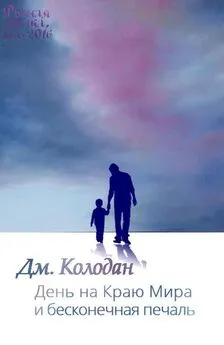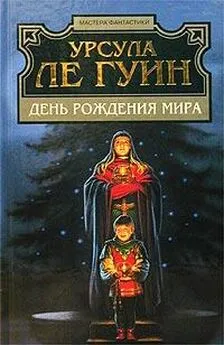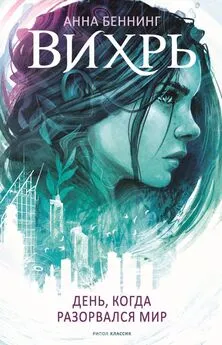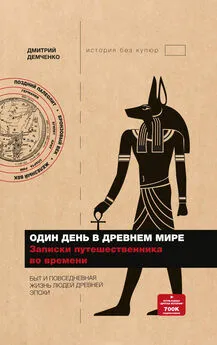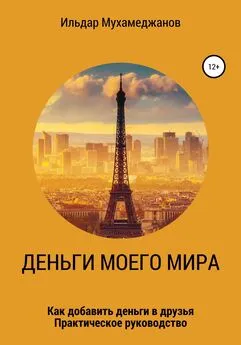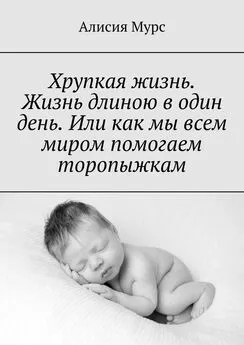Роллан Сейсенбаев - День, когда рухнул мир
- Название:День, когда рухнул мир
- Автор:
- Жанр:
- Издательство:неизвестно
- Год:неизвестен
- ISBN:нет данных
- Рейтинг:
- Избранное:Добавить в избранное
-
Отзывы:
-
Ваша оценка:
Роллан Сейсенбаев - День, когда рухнул мир краткое содержание
Роллан Сейсенбаев – признанный классик казахской литературы. Его романы, повести, рассказы издавались в самых престижных журналах и издательствах России, Англии, Америки, Германии, Италии, Венгрии, Польши, Японии и Кубы.
Роллан Сейсенбаев награжден «Золотым офицерским крестом» Польши, «Золотым Рыцарским Крестом» Венгрии, орденом «Дружбы» Кубы за заслуги перед литературой. Он является обладателем множества международных литературных премий.
Крупнейшие критики мира называют рассказы Роллана Сейсенбаева жемчужинами. Поистине Он уникальный Мастер слова.
Роллан Сейсенбаев стал своеобразным эталоном современной казахской интеллектуальной прозы.
День, когда рухнул мир - читать онлайн бесплатно ознакомительный отрывок
Интервал:
Закладка:
Our excellent demographer showed me an article which cited the Kazakh population in 1913, 1932, 1938 and 1946. Millions died in the war, millions were killed, shot and died from hunger and devastation. Have any statistics included the losses caused by atomic bomb testing, by arbitrary industrialization on Kazakh territory, masterminded by bureaucrats? Not to mention the gradual disappearance and impoverishment– of the Kazakh language! This is yet another of the multitude of tragedies about which both phrase-mongers and campaigners, to this day, remain silent.
„Oh yes, we are slowly dying,“ said my friend’s sister, when we were sitting round the dinner table. „Here, we’ve been told to keep quiet about the underground tests which are being carried out. And it’s happening right under our feet! Where didn’t I write! But no one replied. I know that American women in the state of Nevada have sit-in demonstrations. They have asked us to support their movement with peaceful demonstrations near the Semipalatinsk proving ground, but it’s unlikely that we would be given permission to do this.“ She could not bear it; she was breathless from the rush of words and began to cry quietly. Her husband put his hand on her bony shoulder, trying to calm her. The boy without hands gazed at us vacantly. He drew closer to his mother and she immediately calmed down, understanding that he was hungry. She put a piece of meat into his mouth and fed him broth.
„You try and demonstrate near the proving ground – afterwards, you wouldn’t even find a trace of human bones. Everyone remembers what it was like in Alma-Ata in the winter, during those events. I am ready to die, I try to die, but what will happen to these unfortunate cripples? They’re innocent. I’ll be straight with you. You’re a writer. You know that our people are familiar with firing squads and arrests. Perhaps it’s better to die than to live like this! And where do we go for justice? It’s a long way to Moscow. Our youngest brother disappeared after the December events in Alma-Ata and we still don’t know whether he is alive or not…“
Suddenly, the new-born baby in the suspended cradle began to cry terribly. The five-year-old armless boy quickly climbed down off the stool and began to rock the cradle with his shoulder.
„A curse upon them!“ said the woman. „A curse upon them! When he starts to cry like that it means that they’ll soon start to explode their accursed bombs again. It’s as if they wait until we go to sleep. But he always senses the coming explosion. Can you hear how he’s sobbing?“
The little boy cried louder and louder.
„Aysha, feed him, perhaps he’s hungry,“ said the shepherd quietly and turned to us. „Please, you have hardly had anything to eat.“
There was a gentle apologetic smile upon his face, the courageous, weathered face. Aysha took her son into her arms. I was horrified. The little boy’s crown was almost wide-open and there something was pulsating, throbbing, alive. I rushed outside. A large, shaggy dog, who was getting under my feet, was good-naturedly barking at something in the distance. I walked across the dark yard and threw up round a corner. What is happening to us? What abyss are we falling into? Why are we bringing the end of the world closer, with our own hands?
At that moment, the earth trembled and we heard a muffled roar. The little one was right. They have started IT again. The little one was right.
A horse was tethered to the rail. He stood stock-still as if nothing special was happening in the world. But when I went up to him and stroked his body, the body of a working beast, accustomed to all kinds of hardships, he gratefully put his head on my shoulder; the horse breathed into my ear as if he was whispering some secret words known only to him.
In the mountains, a lone wolf began to howl.
Several barking dogs rushed towards the mountains.
In the sky, there were neither stars nor moon. Heavy clouds, hanging low over the foothills, increased the sensation of an oppressive darkness.
Pitch blackness. I could not see anything.
In the house, the boy incessantly cried. He must have gone mad even before he appeared into the world.
And I too felt that. I would go mad only from the thought of what was happening.
I was unable to close my eyes till the morning. And the house was silent. The master and mistress and my friend had fallen asleep, and the little one, next to whom my bed was laid out, had calmed down.
Memories, thoughts, like wild horses, trampled over me. In that deathly silence, I lay muttering fiercely and agrily:
„No, it won’t be my fate to lie quietly in my grave when I die. When I die, let them scatter my ashes over the steppe and in my native Genghiztau. That is my one and only request. As long as sorrow and suffering are my people’s fate, I will not rest. I will not rest!“
My eyes wide-open, I stared into the darkness; I had the sensation of being scattered through my native land by the wind, like warm ashes. The ashes – the remains of the body – but what of the soul? Where does my soul fly? Will it meet the soul of little Kenje in the universe? Will our souls merge? Tell me, Father.
Father, tell me, Father, why the death of several generations, the killing of the best sons and daughters of the nation does not open the eyes of the living, does not compel them to cherish the honour and glory of our homeland?
If only the blind would open their eyes! Where is their lost vision? The wailing of the millions of those who have disappeared, perished and been tormented, fills the land. And my hot ashes, cooled by the wind, will never know whether the blind will begin to see.
I shivered: two demented spots stared at me – the piercing eyes of the baby boy, one of the most unfortunate children on earth. When his eyes caught mine I let out a cry.
I stepped outside. Dawn was breaking. The uneasy stillness of the early morning light hung in the air. A light smoky cloud appeared over the distant spur of the granite hills of Delegen. The wind chased it somewhere eastwards.
I had been told that this was from the explosion. The hill is crumbling, soon all there will be left is dust… so I was told.
„Greetings, son!“ said my father. He unexpectedly appeared next to me and now hurriedly vanished, evaporating over the steppe. „Son, you can and you must walk barefoot over your native earth. This is your land, the land of your ancestors…“
„Then return my native land to me!“ I cried out. „As my father wished, I want to walk barefoot through the green grass, I want to drink the water from my lakes, I want to lie on the clean, good earth and look up at the clear, good sky. Do you hear me, my country?“
But it was silent. And I, a forty-two-year-old man, stood in the middle of the steppe and howled like the last remaining wolf of the Genghiztau before his death.
And once again the earth shook.
5–8 august, 1988 Semipalatinsk
MY OPINION
THE WORLD NEEDS TO BE RESTRUCTURED – LET US BEGIN WITH US
My people – fellows townsmen, my multinational Kazakhstan has so many physical and mental wounds that one cannot resist shuddering at simply imagining them and can hardly restrain the vision of horrors, shame and tragedy of the people. And, I wonder: which wound is the first we should talk about, which one should we be reminded of?
For many years, A– and H-bombs were tested in the Semipalatinsk region, my native land.
I was a boy of seven, when I was a witness of the first H-bomb explosion in the Chinghiz mountains. I remember my grandfather’s mournful face, myself repeating some words from the Koran. This moment, one of faith in salvation with the help of the Most High is still alive in me; I set great hopes on Him at the time, while being taken back into the rocky high country, in the awful deadly-still emptiness. The first line of my childhood’s unfinished verse began as follows: "The day the world collapsed".
The brightest streaks of the H-bomb explosion… I had never seen such terrible colors before. The inconsolable grief, sufferings and agonizing death of dear and near ones, the lies of the powers that be– all merge into a single tangle.
I am forty three now. On seeing the sufferings of Aral, Semipalatinsk, Dzhambul and Novy Uzen, the humiliated and insulted children’s souls are calling upon me to accept death together with them: I always feel like turning into an ant and dying under the feet of a hungry child. I plead guilty for the human mind’s deeds because great faith in science has converted us into obedient slaves. We have become hostages of progress. The tragedies of Hiroshima and Nagasaki, the devastation of the Aral area, forty-years-long nuclear tests on the Semipalatinsk proving ground – MADNESS.
Today, as always, we talk much, but do little. The great words-FREEDOM, EQUALITY, BROTHERHOOD – have ruthlessly been degraded and emasculated of their meaning. Over many decades there have flourished violence, boorishness, ignorance and self-seeking in this country, which proves that our talk about morals has, for many years, been just prattling. Can it really be true that a feeling of mercy has been exterminated from our everyday life? I remember, however, how my people joined their efforts in building houses, not only for ones who lost all their possessions in a fire, but also for those who hardly made both ends meet. I remember my grandfather having taken me to a mosque and asking me to give alms to the beggars. Then the government declared that we did not have beggars any more.
Great Pushkin’s verses come to my mind: "How in this cruel age I celebrated freedom, and begged for mercy towards those cast down." Pushkin’s behests are the moral demand of any epoch that embraces charity, compassion.
By the will of fate, and by the strength of my mind I always tried to stand aloof from notorious politics, as much as possible. I fervently defended the islet of my loneliness. I was happy that I was getting on in my effort, with difficulty though, believing that in the conditions of moral stagnation one’s active work is a long wayfarer’s cry in the wilderness.
The writer always tries to smooth the wrinkles of real life, of our society whose moral make-up has become intolerable. Our souls have coarsened, venom and envy boil in man. Callousness has wrapped up our home only to lay bare the awful gulf formed between the matter and mind. We have broken from the morals common to all mankind and have repudiated ethics. It is extremely difficult to come into one’s own in such a life. All of us are now having harsh times: a writer, a worker, a scholar, to mention just a few. We have been building socialism for 70-odd years now and have been standing in cues of the hungry.
Once upon a time I wrote a story about a front line soldier who, on going to the front, addressed his beloved with the following words: " We shall lead a well-to-do life after the war." But he returned crippled. We have been living in peace for forty five years already, but neither the soldiers of the War of the Fatherland, nor their sons, nor their grandchildren, participants in the Afghan War, have lived normal lives. The time rolls by, but grief remains on earth, non the less. The whole world has changed after the war, but paradoxically enough the vanquished lead prosperous life and the victors suffer from ignorance and poverty.
We must realize once and for all that political idle fancies and a chimera of the bright future have suppressed the forces of reason and creativity. This is especially valid concerning all that is pertinent to nuclear violence. Going into raptures over military might is vicious. The greatness of a state is defined by its attitude toward man and his lifestyle. Earth men must realize themselves in practice as a single knitted family. At least we must understand that values common to all mankind must be give top priority, vis-a-vis military and position-of-strength aspirations. Unwise politics has always made a rod for its own back.
Читать дальшеИнтервал:
Закладка:
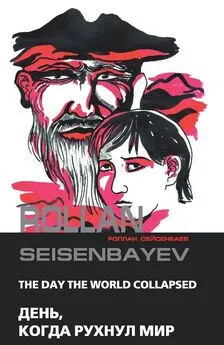
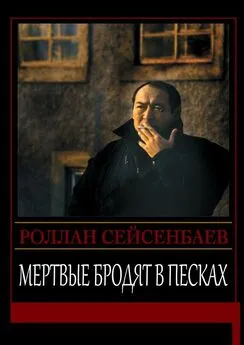
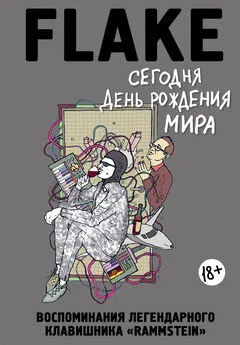
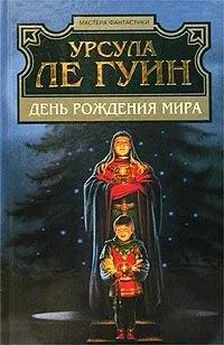
![Кристиан «Флаке» Лоренц - Сегодня День рождения мира [Воспоминания легендарного немецкого клавишника]](/books/1071826/kristian-flake-lorenc-segodnya-den-rozhdeniya-mira.webp)
